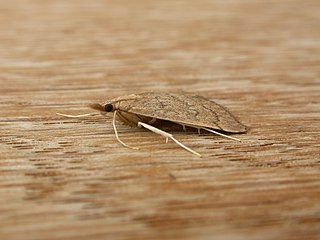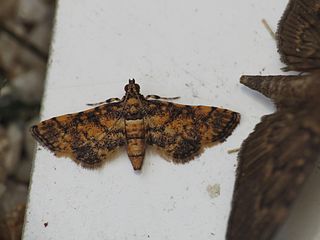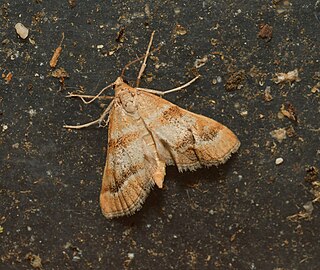
Cyprus, officially the Republic of Cyprus, is an island country in the eastern Mediterranean Sea. It is geographically a part of West Asia, but its cultural ties and geopolitics are overwhelmingly Southeast European. Cyprus is the third largest and third-most populous island in the Mediterranean. It is east of Greece, north of Egypt, south of Turkey, and west of Lebanon and Syria. Its capital and largest city is Nicosia. The northeast portion of the island is de facto governed by the self-declared Turkish Republic of Northern Cyprus.

Northern Cyprus, officially the Turkish Republic of Northern Cyprus (TRNC), is a de facto state that comprises the northeastern portion of the island of Cyprus. It is recognised only by Turkey, and its territory is considered by all other states to be part of the Republic of Cyprus.

Metasia liophaea is a species of moth of the family Crambidae. It is found in Australia, where it has been recorded from New South Wales and the Australian Capital Territory.

Metasia capnochroa is a species of moth of the family Crambidae described by Edward Meyrick in 1884. It is found in Australia, where it has been recorded from New South Wales, South Australia and Tasmania.

Metasia is a genus of moths of the family Crambidae. They are found mainly in Europe and Australia, but also in Africa, Asia, North America, and Pacific islands.

Metasia ophialis is a species of moth of the family Crambidae.

Metasia achroa is a species of moth of the family Crambidae described by Oswald Bertram Lower in 1903. It is known from Australia.

Metasia dicealis is a moth of the family Crambidae described by Francis Walker in 1859. It is known from Australia, where it has been recorded from New South Wales, the Australian Capital Territory and Victoria.

Metasia tiasalis is a species of moth of the family Crambidae.
Metasia albicostalis is a species of moth in the family Crambidae. It is found on Cyprus and in Lebanon and Syria.

Metasia carnealis is a species of moth in the family Crambidae. It is found in France, Spain, Italy, Austria, Croatia, Bosnia and Herzegovina, Romania, Bulgaria, the Republic of North Macedonia, Albania, Greece and on Sardinia and Sicily, as well as in Turkey.
Metasia gigantalis is a species of moth in the family Crambidae. It is found in Greece, the Republic of Macedonia and on Cyprus, Crete and Sicily.

Metasia corsicalis is a species of moth in the family Crambidae. It is found in France, Spain, Italy, Croatia and on Corsica, Sardinia, Sicily and Malta.

Metasia cuencalis is a species of moth in the family Crambidae. It is found in France, Spain and Portugal, as well as in North Africa, including Morocco.

Metasia rosealis is a species of moth in the family Crambidae. It is found in Greece, on Cyprus, as well as in the Near East, including Turkey, Lebanon and Syria.

Metasia suppandalis is a species of crambid snout moth in the family Crambidae. It is found in southern Europe, North Africa, and southwestern Asia.
Eristena parvalis is a moth in the family Crambidae. It was described by Frederic Moore in 1877. It is found on the Andamans.
Metasia hemicirca is a moth in the family Crambidae. It was described by Edward Meyrick in 1887. It is found in Australia, where it has been recorded from Tasmania.
Metasia triplex is a moth in the family Crambidae. It was described by Turner in 1913. It is found in Australia, where it has been recorded from Queensland.
Metasia zophophanes is a moth in the family Crambidae. It was described by Turner in 1937. It is found in Australia, where it has been recorded from Queensland.













